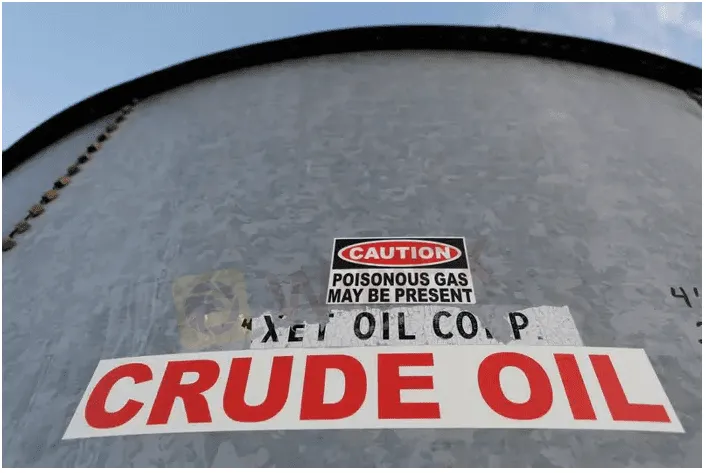简体中文
繁體中文
English
Pусский
日本語
ภาษาไทย
Tiếng Việt
Bahasa Indonesia
Español
हिन्दी
Filippiiniläinen
Français
Deutsch
Português
Türkçe
한국어
العربية
Oil drops as China’s rising COVID cases renew fuel demand concerns
Abstract:Oil prices fell $1 in early trading in Asia on Monday, cutting into gains from Friday, as attention turned back to rising COVID-19 cases in China and the prospect of lockdowns again reducing fuel demand in the world’s top oil

Oil prices fell $1 in early trading in Asia on Monday, cutting into gains from Friday, as attention turned back to rising COVID-19 cases in China and the prospect of lockdowns again reducing fuel demand in the worlds top oil importing nation.
U.S. West Texas Intermediate (WTI) crude futures for August delivery dropped $1.54, or 1.6%, to $96.05 a barrel at 0055 GMT, after climbing 1.9% on Friday.
Brent crude futures for September settlement fell $1.47, or 1.5%, to $99.69 a barrel, paring a 2.1% gain from Friday.
China, the worlds second-largest oil consumer, on Sunday reported 691 new COVID cases for Saturday, up from 547 the previous day, with locally transmitted cases at the highest since May 23.
“Oil is opening the week softer as the market digests the demand impact of the rise in new COVID cases in China and as the market cautiously awaits the monumental event risk if Nord Stream 1 gas flow from Russia to Europe will resume later this week,” said Stephen Innes, managing partner at SPI Asset Management.
The Nord Stream 1 pipeline, the biggest system carrying Russian natural gas to Germany, began annual maintenance on July 11 due to last 10 days. Governments, markets and companies fear the shutdown may be extended because of the war in Ukraine.
Loss of that gas would hit Germany, the worlds fourth-largest economy, hard and heighten the threat of a recession.
As expected, U.S. President Joe Biden‘s trip to Saudi Arabia failed to yield any pledge from the top OPEC producer to boost oil supply. That expectation of no extra oil helped push prices up last Friday ahead of Biden’s talks with Saudi Crown Prince Mohammed bin Salman.
Biden wants Gulf oil producers to step up output to help tame oil prices and drive down inflation.
On Sunday, Amos Hochstein, a senior U.S. State Department adviser for energy security, said on CBS Face the Nation that the trip would result in oil producers taking “a few more steps” in terms of supply though he did not say which country or countries would boost output.
The next meeting of the Organization of the Petroleum Exporting Countries (OPEC) and allies including Russia, together called OPEC+, on Aug. 3, will be closely watched as their existing output pact expires in September.

Disclaimer:
The views in this article only represent the author's personal views, and do not constitute investment advice on this platform. This platform does not guarantee the accuracy, completeness and timeliness of the information in the article, and will not be liable for any loss caused by the use of or reliance on the information in the article.
Read more

Forex Hedging: Is It a Trader’s Safety Net or Just an Illusion?
In the volatile world of forex trading, risk is inevitable. One widely used strategy is forex hedging, which is a useful technique designed not to eliminate risk entirely, but to reduce its potential impact. As global economic uncertainty persists, understanding how hedging works could be an essential addition to a trader’s toolkit.

Thinking of Investing? Read Must-Know Facts About Funding pips!
When you check the internet for Funding Pips, you'd be surprised to know it's filled with praise for Funding Pips but often lacks the real facts that traders need. Everything that seems too good to be true should always be verified first. It could be Fraud . So, we conducted research and collected several facts you must know about Funding Pips.

OctaFX Back in News: ED Attaches Assets Worth INR 134 Cr in Forex Scam Case
The Enforcement Directorate (ED) in Mumbai has attached assets worth around INR 131.45 crore. This included a luxury yacht and residential properties in Spain. Read this interesting story.

Oil Prices Stay Firm on Solid US Jobs Data
Oil prices stayed firm this week as the US labour department posted a better-than-expected payroll data in June 2025. Read this news in detail.
WikiFX Broker
Latest News
Global Brokers Vs. Indian Rules: Why They Struggle in India
Services Surveys Signal 'Expansion' In June, Inflation Fears Remain High
ASIC cancels AFS licences of Ipraxis and Downunder Insurance Services
CFD Brokers Face Dual Compliance Pressures Ahead of 2026: Australia and EU Tighten Rules
FxPro to Launch Crypto Trading Desk, Deepening Digital Asset Push
CFI Financial Group Becomes Official Online Trading Partner of Etihad Arena
Discover 5 Benefits of Trading with Trive FX Broker
Major Risks Associated with AuxiliumFX: You Need to Know
IPO market gets boost from Circle's 500% surge, sparking optimism that drought may be ending
Asia-Pacific markets trade mixed ahead of Trump's deadline for higher tariffs
Currency Calculator


